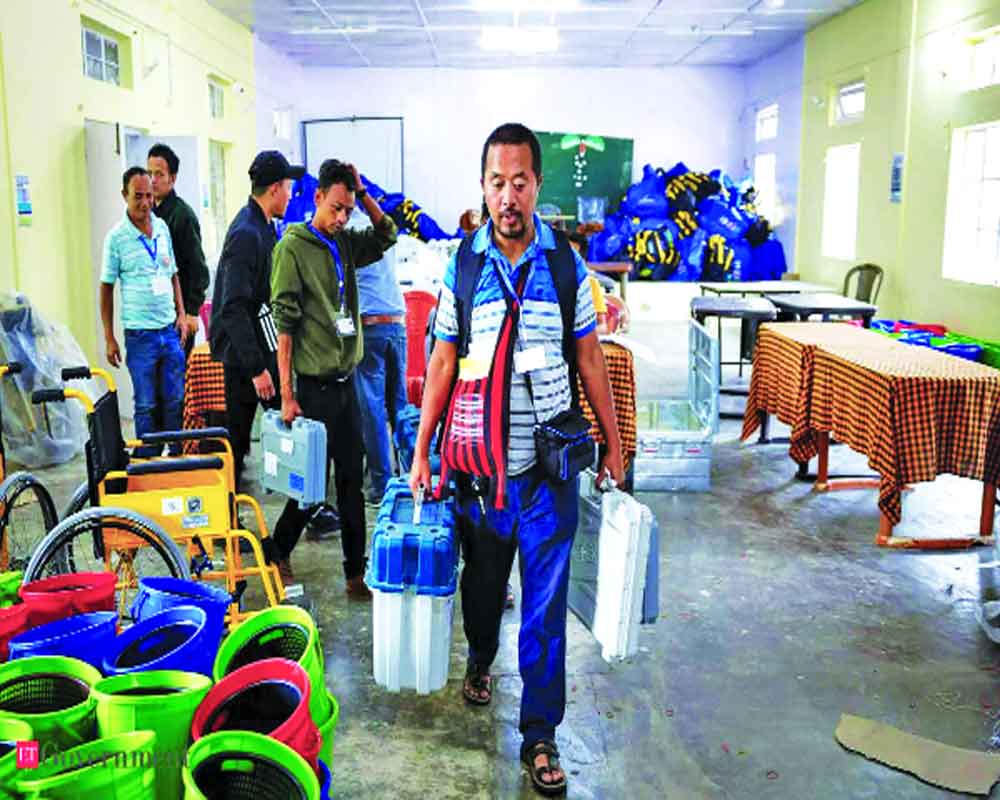With stakes being high for the BJP which had won an overwhelming majority of these seats, including all in Gujarat, Karnataka, Bihar and Madhya Pradesh, in the 2019 general elections, political bigwigs Union Ministers Amit Shah, Jyotiraditya Scindia, Mansukh Mandaviya, Parshottam Rupala Congress stalwart Digvijay Singh, to NCP’s (Sharad Pawar faction) Supriya Sule and Samajwadi Party’s Dimple Yadav are amongst several others from ruling and Opposition side who are in the fray for the voting to be held in 93 constituencies spread over 12 States and Union Territories on Tuesday in the third phase of Lok Sabha polls.
Over 1,300 candidates, including around 120 women, are in the fray for the 93 parliamentary seats in 12 States and Union Territories. Modi and Shah will cast their votes at booths in Ahmedabad city that fall under Gandhinagar Lok Sabha seat.
After the third phase of polling, more than half of India will be covered. A total 283 will be covered after the third phase of polling.
According to EC, over 17.24 crore voters will cast their vote in the third phase for 93 parliamentary seats. A total of 1,041 inter-State and 275 International Border check posts are keeping strict vigil on any illicit flow of liquor, drugs, cash and freebies. Strict surveillance has been kept at sea and air routes.
With the BJP bagging Surat unopposed, 25 seats in Prime Minister Modi’s home State of Gujarat will go to polls on May 7, besides 11 seats in Maharashtra, 10 seats in Uttar Pradesh, the remaining 14 of the 28 in Karnataka, seven in Chhattisgarh, five in Bihar, four each in Assam and West Bengal, and all two in Goa.
The Union Territory of Dadra and Nagar Haveli and Daman and Diu (2 seats) and nine seats in Madhya Pradesh, including Betul where elections were deferred, will also go to polls on Tuesday and over 11 crore people will be eligible to vote.
Campaigning for the third phase witnessed the Constitution and reservation issue dominating the poll discourse. The stakes are significant for the BJP and its allies, which had, in 2019, won 75 of the 93 seats going to polls on Tuesday, while the INDIA Bloc parties had won only 11. Four seats had gone to the undivided Shiv Sena, two were won by independents, and one by the AIUDF.
With the first two phases registering a dip in voter turnout as compared to 2019, the question is whether the third phase will buck the trend amid hot weather and heat waves in these States.
After the third phase, voting will be completed in 283 out of 243 seats in the Lok Sabha. The next four phases will be on May 13, May 20, May 25 and June 1. Counting of votes is on June 4. Jammu and Kashmir’s Anantnag-Rajouri Lok Sabha seats were also to vote in the third phase of polling. However, due to several connectivity issues, the Election Commission of India rescheduled it to May 25.
During the campaign, the BJP had to face the ire of the Kshatriya community over a remark made by Rupala in Rajkot.
He had claimed several rulers from the community had “roti and beti” (marriage and trade) relations with the British and other foreign invaders.
The current phase is important for Mulaym Singh Yadav’s family, with Dimple Yadav aiming to retain the Mainpuri Lok Sabha seat. Akshaya Yadav, son of Ram Gopal Yadav, is contesting from Firozabad, and Aditya Yadav is making his electoral debut from the Budaun Lok Sabha seat.
In Madhya Pradesh where Union Minister Jyotiraditya Scindia and former State Chief Ministers Shivraj Singh Chouhan and Digvijaya Singh are in the fray. At stake is the political future of Scindia, seeking to reclaim the home turf Guna which he lost in 2019 when he was in the Congress.
In Maharashtra, the spotlight is on the high-stakes battle in Baramati, where Sharad Pawar’s daughter Supriya Sule is pitted against Sunetra Pawar, wife of the veteran leader’s estranged nephew and Maharashtra deputy Chief Minister Ajit Pawar.
Amid heightened security with the deployment of 202 companies of Central forces and more than 60,000 personnel of police force and District Reserve Guard, the remaining seven Lok Sabha seats in Chhattisgarh will vote on Tuesday.
The third phase of Lok Sabha elections in West Bengal will see four Muslim-majority constituencies, with the division of minority votes among the Left-Congress combine and the TMC and narrative on the Citizenship Amendment Act potentially shaping the outcome.
The third round of polls will also witness INDIA Bloc partners at the national level - the TMC and the Left-Congress combine — fighting separately in the state in an intense battle of political supremacy in Maldaha Uttar, Maldaha Dakshin, Jangipur and Murshidabad. More than 11 lakh voters are eligible to exercise their franchise in elections to both the Lok Sabha seats in Goa where the Congress and BJP are locked in a straight fight.
























